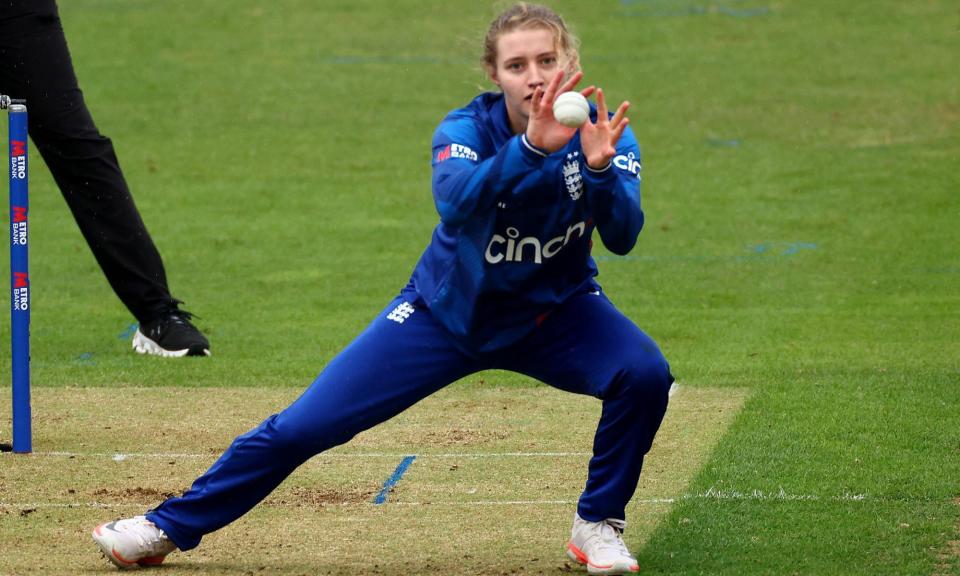England Women’s Charlie Dean is major doubt for opening T20 in India

England Women may have to do without Charlie Dean in their Twenty20 series opener against India on Wednesday, after the off-spinner picked up a stomach bug during the recent England A series with India.
Jon Lewis, the England head coach, had hoped to deploy the 22-year-old as a third spin option during the tour, but the captain, Heather Knight, said Dean was still recovering from illness and that it was in doubt whether she would be fit for the opener in Mumbai on Wednesday.
Related: David and Kate Cross: the dad and daughter who won FA Cup and Ashes
More promising news for England is the likely return of Sophie Ecclestone to international action after the world No 1’s shoulder injury, which kept her out of the series against Sri Lanka in September. On Tuesday, Knight described the left‑arm spinner as “fit and firing”.
England face India in three T20s at the Wankhede Stadium in Mumbai, followed by a four-day Test – incredibly, the first time in 18 years that England’s women have played a Test in the subcontinent. It is England’s first assignment since a T20 series defeat against Sri Lanka at home in September and could prove a stern test of their ability to deal with subcontinental conditions.
Against Sri Lanka, Knight’s side were bowled out for 104 and 116, with 15 of those 20 wickets falling to spin. In response, Lewis organised an emergency batting boot camp in Mumbai in October, involving the next-gen crew of Alice Capsey, Sophia Dunkley, Danielle Gibson, Bess Heath, Freya Kemp and Emma Lamb. The aim was to offer a taster of what is to come in the next couple of years, which will feature the 2024 T20 World Cup in Bangladesh and the 2025 50-over edition in India.
Lewis has described the camp as “a really good learning experience” for a group of players who are relative novices in Indian conditions. England’s last tour of India was in 2019, meaning that 11 members of the current squad have never played international cricket there, although two of those 11 – Capsey and Lauren Bell – featured in the Women’s Premier League in March.
The most recent bilateral encounter between the sides, in September 2022, ended in controversy after England lost the final one-day international at Lord’s after Deepti Sharma’s Mankad run-out of Dean backing up at the non-striker’s end.
“India are a brilliant team and in their own conditions we know it’s going to be tough,” Knight said. “We saw great support in Mumbai during the WPL and trying to silence those crowds will be tough. Playing in India really tests your skill and your character in how to deal with the noise, the heat and the conditions.”
The series comes on the back of the announcement on Monday of the latest batch of England central contracts, under which Gibson and Maia Bouchier were awarded their first deals. The 22-year-old wicketkeeper-in-waiting Heath, plus the fast bowlers Lauren Filer and Mahika Gaur, are the beneficiaries of the new development contracts, designed to support players whom the England and Wales Cricket Board expects to play a major role in future years.
In addition, the ECB is seeking to revitalise the women’s domestic game via Project Darwin, which was formally approved at a board meeting last week. This will mean the existing eight regional sides are folded back into the first‑class counties before the 2025 season. The eight county hosts will be decided via a tender process, due to commence next month.
Currently, the regions are owned by the ECB and run independently of the counties. However, while this separate structure – introduced in 2020 – was an important first step in expanding the professional player base in England and Wales, it has been less successful at growing women’s domestic cricket from a commercial perspective.
While the teams are likely to retain an element of their existing branding after the restructure – for example, Southern Vipers are expected to become Hampshire Vipers – handing ownership to the counties will enable joined-up marketing campaigns and fully aligned double-headers, two of the strategies that have been so successful in growing audiences at women’s cricket in the Hundred.

